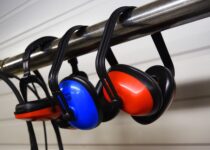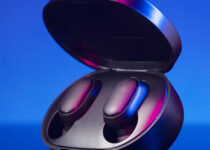Can you wear headphones with an ear infection?
Do you ever find yourself caught between the discomfort of an ear infection and your craving for some sweet tunes or a captivating podcast?
We understand the agony of wanting to wear headphones with an ear infection, and we’ve got the solution you’ve been searching for.
In this article, we’ll delve into the pain points of ear infections and how our expert advice can help you enjoy your audio experience without aggravating the problem.
Here is how to wear headphones with a hoodies.
Can you wear headphones with an ear infection?
Well wearing headphones with an ear infection is generally not recommended.
Ear infections can cause pain, inflammation, and increased sensitivity in the affected ear.

Putting pressure on the ear with headphones can exacerbate these symptoms, potentially leading to further discomfort and delaying the healing process.
It’s best to consult a medical professional for personalized advice based on the specific infection type and severity.
They can provide appropriate guidance, and it’s wise to prioritize ear health and well-being by avoiding headphones until the infection has resolved.
Can I Wear Over-Ear Headphones With Ear Infection?
A study conducted in Malaysia aimed to investigate whether customer service representatives, who wore headphones for nearly seven hours daily, faced an increased risk of ear infections or hearing loss.
The results revealed that only a minimal percentage (around 5%) of employees experienced external ear canal infections and earwax buildup.
Hence, over-ear headphones, under typical usage conditions, were not the primary cause or contributor to ear infections.
In encouraging news, individuals can confidently wear over-ear headphones and enjoy music without worrying about developing ear infections.
However, the study primarily focused on assessing employees’ auditory health and the connection between frequent headphone use and hearing loss.
It was concluded that listening to audio at moderate volumes was not the main cause of hearing loss.
The study did not emphasize the potential role of bacteria and fungi on headphones but referred to an earlier study that compared bacterial growth on earplugs used by pilots.
This study found that even without daily sanitization, earplugs did not generally lead to bacterial infections or fungal growth in most test subjects.
However, it’s crucial to note that sharing headphones, wearing them during workouts, or extended use of earbuds and headphones throughout the day could increase the risk of infection or exacerbate existing ones.
ENT doctors (otolaryngologists) are likely to concur with this assessment, emphasizing the importance of responsible and hygienic headphone usage.
Here, why do defendants wear headphones in court?
How to Avoid Ear Infections when I’m Wearing Over-Ear Headphones?
To prevent ear infections when wearing over-ear headphones, consider these practices:

1. Keep Headphones Clean:
Regularly clean your headphones with a soft, damp cloth to remove dirt, sweat, and bacteria. Pay attention to ear cushions, which can accumulate moisture and germs.
2. Personal Use:
Avoid sharing your headphones with others, as it can introduce foreign bacteria and fungi into your ears.
3. Hygiene:
Maintain good ear hygiene by cleaning your ears gently with a washcloth. Avoid inserting objects like cotton swabs or fingers deep into your ear canal, as this can damage the ear’s natural defenses.
4. Take Breaks:
To prevent moisture buildup, give your ears and skin a break from headphones periodically, especially in hot or humid conditions.
5. Volume Control:
Listen to audio at a moderate volume. High volumes can damage your hearing and may also lead to the development of ear infections in the long run.
6. Headphone Fit:
Ensure your headphones fit comfortably and don’t press too tightly against your ears. Pressure can cause discomfort and potentially contribute to ear issues.
Here can you wash headphone pads?
7. Clean Earmuffs:
If your headphones have removable earmuffs or cushions, clean them regularly according to the manufacturer’s instructions. Replace them if they show signs of wear and tear.
8. Ear Health Check:
If you experience discomfort, pain, or unusual symptoms in your ears, discontinue headphone use and consult a healthcare professional for an ear health assessment.
9. Limit Prolonged Use:
Avoid wearing over-ear headphones for extended periods, especially during exercise or in hot, humid conditions where sweat can accumulate.
10. Use Noise-Canceling Features Mindfully:
If your headphones have active noise cancellation, use it at a level where you can still hear your surroundings to prevent accidents and keep your ears ventilated.
Remember, while following these guidelines can reduce the risk of ear infections, if you develop persistent ear discomfort, pain, or infection, consult with a healthcare provider for a proper diagnosis and treatment.
What Causes Ear Infections to Develop?
Ear infections often result from bacterial or viral invaders in the ear canal or middle ear.

The primary causes include:
- Bacterial or Viral Infections: Common colds, respiratory infections, and other illnesses can introduce bacteria or viruses into the ear.
- Eustachian Tube Dysfunction: When the Eustachian tube, responsible for equalizing ear pressure, doesn’t work correctly, it can lead to fluid buildup and infection in the middle ear.
- Moisture Accumulation: Prolonged exposure to moisture, like swimming or excessive sweating, can create an environment where bacteria and fungi thrive.
- Anatomy: Some individuals, especially children, may have anatomical factors that make them more prone to ear infections.
- Allergies: Allergic reactions can lead to inflammation and fluid buildup, increasing the risk of infection.
What should you avoid with an ear infection?
When you have an ear infection, it’s essential to avoid actions that can exacerbate the condition or impede the healing process.
Here’s what to steer clear of:
- Headphones and Earbuds: Refrain from using headphones or earbuds as they can introduce pressure, moisture, and bacteria into the ear.
- Water Exposure: Avoid swimming, and if necessary, use waterproof earplugs or a swim cap to prevent water from entering the ear.
- Inserting Objects: Do not insert cotton swabs or any objects into the ear canal, as this can push bacteria deeper or damage the ear.
- Loud Noises: Exposure to loud sounds can increase discomfort and potentially harm the ear, so minimize noisy environments and avoid high-volume music.
- Self-Treatment: Resist the urge to self-diagnose or treat with over-the-counter ear drops without consulting a healthcare professional. It’s crucial to follow their advice for appropriate care.
Should I avoid headphones if I have an ear infection?
If you have an ear infection, it’s generally advisable to avoid wearing headphones, especially in-ear or over-ear headphones.
Ear infections can cause pain, increased sensitivity, and inflammation in the ear, and wearing headphones can exacerbate these symptoms.
The pressure, moisture, and potential introduction of bacteria can worsen the infection or prolong the healing process.
To prioritize your ear health, it’s best to consult a healthcare professional for personalized guidance on whether it’s safe to use headphones during your specific ear infection.
They can offer tailored advice based on the type and severity of the infection.
Here is how to make your airpods louder.
How long should I wait to use headphones after an ear infection?
The duration you should wait before using headphones after an ear infection varies depending on the type and severity of the infection and your individual healing process.
In general, it’s advisable to wait until all symptoms have completely resolved and your healthcare provider gives the green light.
This can range from a few days to several weeks, as it’s crucial to ensure the ear has fully healed and is free from any residual inflammation or infection.
Following medical advice is essential to prevent a relapse or further complications, so consult your healthcare professional for specific guidance tailored to your situation.
Dos And Don’ts while having an infection?
Dos and don’ts when you have an infection:
Do:
- Follow Medical Advice: Adhere to your healthcare provider’s instructions for treatment, medications, and follow-up appointments.
- Maintain Good Hygiene: Keep the infected area clean and follow proper hand hygiene to prevent the spread of the infection.
- Rest: Get adequate rest to bolster your immune system’s ability to fight the infection.
- Stay Hydrated: Drink plenty of fluids to stay well-hydrated and support your recovery.
Don’t:
- Self-Medicate: Avoid self-diagnosis and treatment; always consult a healthcare professional for proper guidance.
- Ignore Symptoms: If symptoms worsen or persist, do not delay seeking medical attention.
- Spread Infection: Practice good respiratory hygiene and handwashing to prevent infecting others.
- Engage in Risky Behavior: While infected, refrain from activities that may compromise your health or exacerbate the infection.
Here how to connect two headphones to iPhone?
Now let’s move to some related faqs
Related faq’s
Can I wear headphones when I have an ear infection?
It’s generally not advisable to wear headphones when you have an ear infection.
Headphones can exacerbate pain and discomfort, introduce pressure or moisture, and potentially hinder the healing process.
Consult a healthcare professional for personalized guidance regarding headphone use during your specific ear infection.
Can headphones irritate ear infections?
Yes, headphones can irritate an ear infection.
They may introduce pressure, friction, and moisture, potentially worsening the discomfort and slowing the healing process.
It’s generally best to avoid using headphones when dealing with an ear infection to prioritize ear health and recovery.
What should you avoid with an ear infection?
With an ear infection, avoid inserting objects into the ear, loud noises, exposure to water, and self-treatment.
Additionally, it’s best to steer clear of using headphones, which can introduce pressure and moisture, potentially exacerbating the infection and discomfort.
Consult a healthcare professional for proper care and guidance.
Should I use headphones if my ears hurt?
If your ears hurt, it’s generally best to avoid using headphones, as they can exacerbate discomfort by adding pressure and friction.
Prioritize your ear health and consult a healthcare professional to address the underlying cause of the pain before considering headphone use.
Conclusion:
In conclusion, while wearing headphones with an ear infection may seem tempting, it’s crucial to prioritize your health.
Exposing your ears to loud audio can worsen the condition.
Instead, consider using open-ear headphones or consult a medical professional for safer alternatives. Now, can you risk your hearing for a tune?



